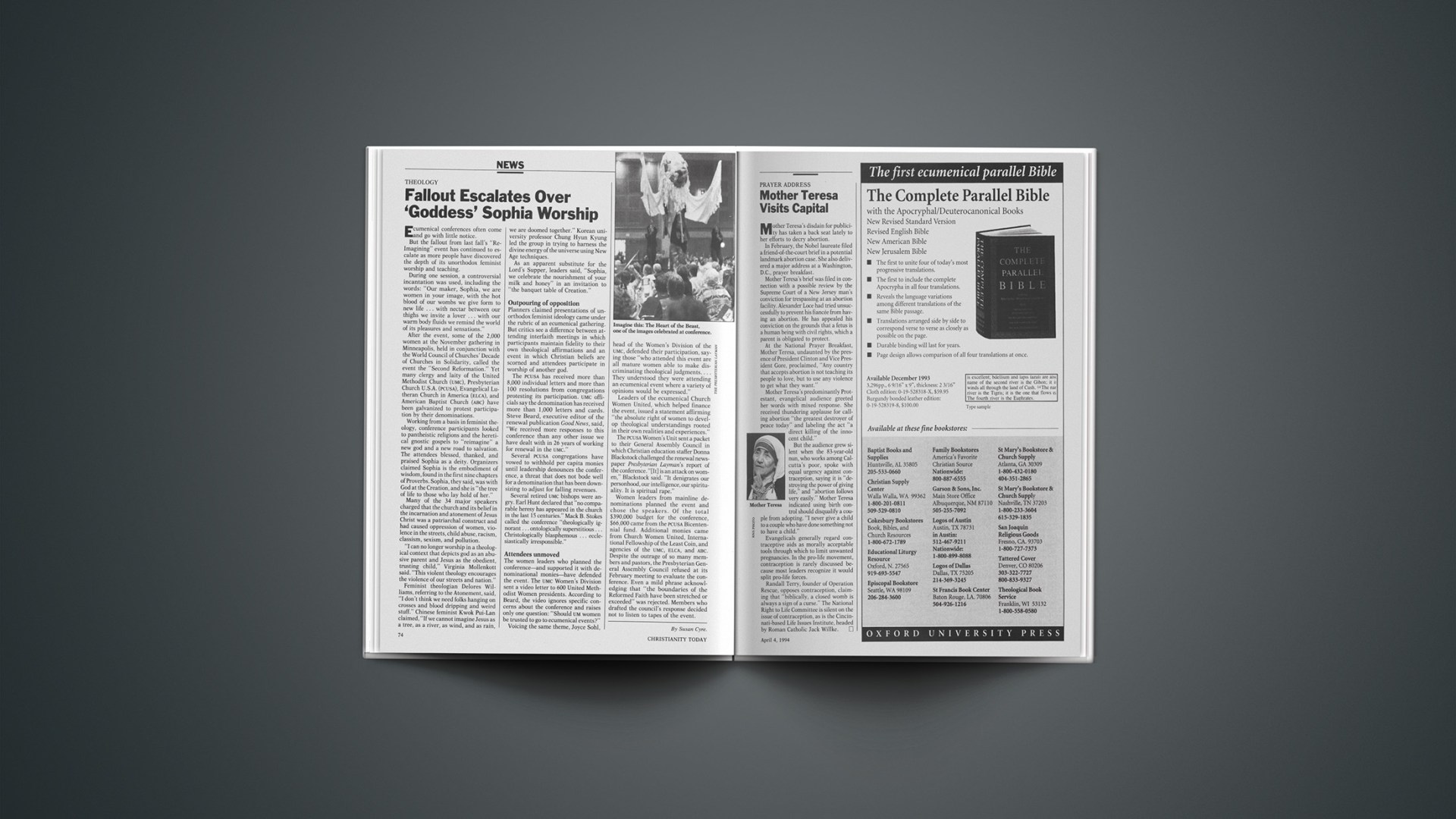Ecumenical conferences often come and go with little notice.
But the fallout from last fall’s “Re-Imagining” event has continued to escalate as more people have discovered the depth of its unorthodox feminist worship and teaching.
During one session, a controversial incantation was used, including the words: “Our maker, Sophia, we are women in your image, with the hot blood of our wombs we give form to new life … with nectar between our thighs we invite a lover … with our warm body fluids we remind the world of its pleasures and sensations.”
After the event, some of the 2,000 women at the November gathering in Minneapolis, held in conjunction with the World Council of Churches’ Decade of Churches in Solidarity, called the event the “Second Reformation.” Yet many clergy and laity of the United Methodist Church (UMC), Presbyterian Church U.S.A. (PCUSA), Evangelical Lutheran Church in America (ELCA), and American Baptist Church (ABC) have been galvanized to protest participation by their denominations.
Working from a basis in feminist theology, conference participants looked to pantheistic religions and the heretical gnostic gospels to “reimagine” a new god and a new road to salvation. The attendees blessed, thanked, and praised Sophia as a deity. Organizers claimed Sophia is the embodiment of wisdom, found in the first nine chapters of Proverbs. Sophia, they said, was with God at the Creation, and she is “the tree of life to those who lay hold of her.”
Many of the 34 major speakers charged that the church and its belief in the incarnation and atonement of Jesus Christ was a patriarchal construct and had caused oppression of women, violence in the streets, child abuse, racism, classism, sexism, and pollution.
“I can no longer worship in a theological context that depicts god as an abusive parent and Jesus as the obedient, trusting child,” Virginia Mollenkott said. “This violent theology encourages the violence of our streets and nation.”
Feminist theologian Delores Williams, referring to the Atonement, said, “I don’t think we need folks hanging on crosses and blood dripping and weird stuff.” Chinese feminist Kwok Pui-Lan claimed, “If we cannot imagine Jesus as a tree, as a river, as wind, and as rain, we are doomed together.” Korean university professor Chung Hyun Kyung led the group in trying to harness the divine energy of the universe using New Age techniques.
As an apparent substitute for the Lord’s Supper, leaders said, “Sophia, we celebrate the nourishment of your milk and honey” in an invitation to “the banquet table of Creation.”
Outpouring of opposition
Planners claimed presentations of unorthodox feminist ideology came under the rubric of an ecumenical gathering. But critics see a difference between attending interfaith meetings in which participants maintain fidelity to their own theological affirmations and an event in which Christian beliefs are scorned and attendees participate in worship of another god.
The PCUSA has received more than 8,000 individual letters and more than 100 resolutions from congregations protesting its participation. UMC officials say the denomination has received more than 1,000 letters and cards. Steve Beard, executive editor of the renewal publication Good News, said, “We received more responses to this conference than any other issue we have dealt with in 26 years of working for renewal in the UMC.”
Several PCUSA congregations have vowed to withhold per capita monies until leadership denounces the conference, a threat that does not bode well for a denomination that has been downsizing to adjust for falling revenues.
Several retired UMC bishops were angry. Earl Hunt declared that “no comparable heresy has appeared in the church in the last 15 centuries.” Mack B. Stokes called the conference “theologically ignorant … ontologically superstitious … Christologically blasphemous … ecclesiastically irresponsible.”
Attendees unmoved
The women leaders who planned the conference—and supported it with denominational monies—have defended the event. The UMC Women’s Division sent a video letter to 600 United Methodist Women presidents. According to Beard, the video ignores specific concerns about the conference and raises only one question: “Should UM women be trusted to go to ecumenical events?”
Voicing the same theme, Joyce Sohl, head of the Women’s Division of the UMC, defended their participation, saying those “who attended this event are all mature women able to make discriminating theological judgments.… They understood they were attending an ecumenical event where a variety of opinions would be expressed.”
Leaders of the ecumenical Church Women United, which helped finance the event, issued a statement affirming “the absolute right of women to develop theological understandings rooted in their own realities and experiences.” The PCUSA Women’s Unit sent a packet to their General Assembly Council in which Christian education staffer Donna Blackstock challenged the renewal newspaper Presbyterian Layman’s report of the conference. “[It] is an attack on women,” Blackstock said. “It denigrates our personhood, our intelligence, our spirituality. It is spiritual rape.”
Women leaders from mainline denominations planned the event and chose the speakers. Of the total $390,000 budget for the conference, $66,000 came from the PCUSA Bicentennial fund. Additional monies came from Church Women United, International Fellowship of the Least Coin, and agencies of the UMC, ELCA, and ABC. Despite the outrage of so many members and pastors, the Presbyterian General Assembly Council refused at its February meeting to evaluate the conference. Even a mild phrase acknowledging that “the boundaries of the Reformed Faith have been stretched or exceeded” was rejected. Members who drafted the council’s response decided not to listen to tapes of the event.
By Susan Cyre.









